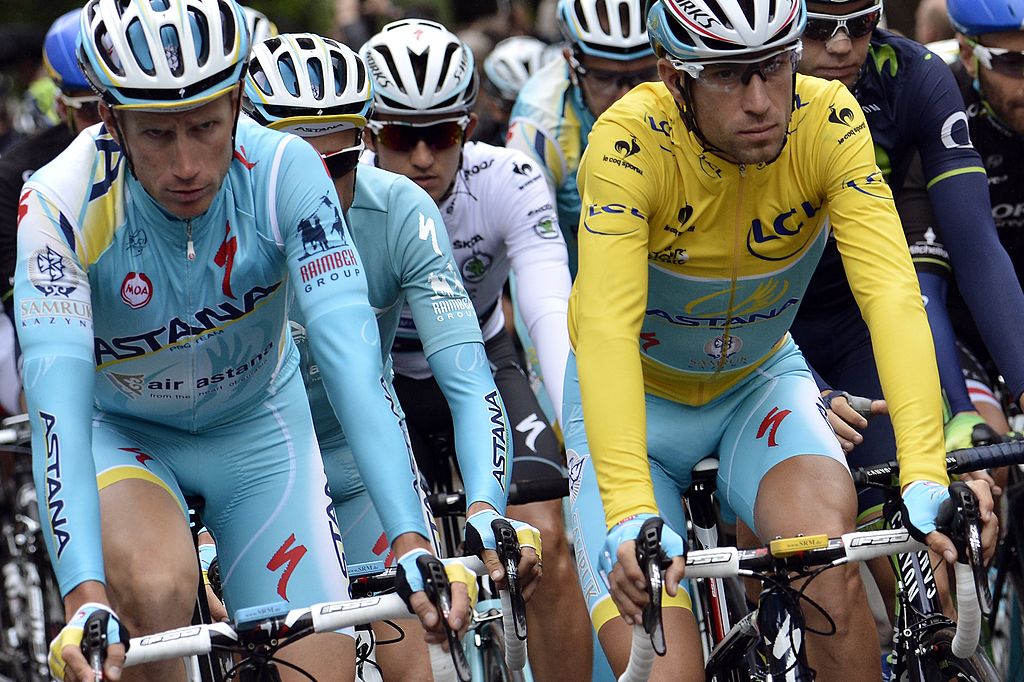Vincenzo Nibali pays tribute to the late Lieuwe Westra
'Not speaking the same language wasn't a big problem, we understood one another' says Nibali

Vincenzo Nibali has paid tribute to his late teammate Lieuwe Westra, who died on Sunday at the age of 40. Westra was a part of Nibali’s guard on the 2014 Tour de France, most notably shepherding him across the cobbles on the race-defining stage to Arenberg in the opening week.
"Lieuwe was a great lad, he lived for the bike," Nibali wrote in a column in Monday’s edition of La Gazzetta dello Sport.
"He didn’t speak very much, but he knew exactly how to move in the bunch. And in team meetings, I can remember how happy he was whenever he was given the task of going in the break."
During his time at Astana, Westra joked that he understood only one Italian word: 'piano', the calming instruction repeated over and again by his leader Nibali.
"Not speaking the same language wasn’t a big problem, we understood one another," wrote Nibali. "On the ‘famous’ cobbled stage of the Tour de France, where I gained on all my GC rivals, his help was vital, first by being in the break and then by pulling for me. He was crucial, it was a real pleasure to have him on the team."
Nibali learned of Westra’s death on Sunday morning from their former Astana teammate Enrico Gasparotto, now a directeur sportif at Bora-Hansgrohe.
"I hadn’t heard from him in the last years, but his death has filled my heart with sadness. A lot of sadness," Nibali wrote.
The latest race content, interviews, features, reviews and expert buying guides, direct to your inbox!
The Italian’s words were echoed by Westra’s compatriot and former Vacansoleil teammate Jonny Hoogerland. In an interview with Wielerflits, Hoogerland recalled how Westra helped him take possession of the king of the mountains jersey at the 2011 Tour and how he set up his Dutch national title win two years later, as well as paying tribute to his friend’s human qualities.
"Lieuwe was too good, he was always there for everyone. He achieved very nice things for himself, but he was extremely able to sacrifice himself for others," said Hoogerland, who had last attempted to contact Westra last month.
"He fell into depression. A lot of people always wanted to help him, but he was actually beyond help. It's very sad to see such a top athlete, someone who can be so hard on himself, end up utterly alone. No one could really get in touch with him anymore," Hoogerland said.
"At Christmas I sent him another message, ‘Happy Christmas, Lieuwe’, but there was no response. It's very sad that it ended this way."
Laurens De Vreese helped Westra to overall victory at the 2016 Three Days of De Panne, and the Belgian recalled how they had often trained together during their time at Astana and particularly before that race.
"We really trained like animals together. Your nickname was ‘the beast’. We left nothing to chance. You were not a Spring Classics rider but I believed that with your big engine we could win the Three Days of De Panne and together we did it with verve," De Vreese wrote on Instagram.
"After your cycling career, I tried to keep in touch with you, because I particularly appreciated and liked you as a friend... Unfortunately, this didn't work out and you wanted to distance yourself. You were in too many knots with yourself. This was a particularly hard blow for me. But I respected your choice, just as I respect your choice now."
'He got lost in the dark'
A native of Friesland, Westra was a late arrival to the top level, turning professional with Vacansoleil in 2009. He enjoyed a breakout season in 2012, winning a stage of Paris-Nice at Mende and placing a close second overall to Bradley Wiggins, before landing the Tour of Denmark and the first of two successive Dutch time trial titles.
On moving to Astana in 2014, Westra landed stage wins at the Volta a Catalunya and Critérium du Dauphiné, while also helping Nibali to Tour victory. Although Westra had agreed to ride for Wanty-Groupe Gobert in 2017, he announced his retirement days into the new year.
In 2018, Westra published his autobiography, titled The Beast, in which he wrote of his struggle with depression and alcohol abuse. In the book, ghost written by Thomas Sijtsma, Westra also revealed that he had feigned injury to obtain TUEs for cortisone during his time at Astana, and he had also used Tramadol in races.
Writing for Trouw, Sijtsma recalled the last time he had met Westra, in September of last year at the garage where he worked as a mechanic.
"After disturbing messages from friends and family, I visited him in a car garage on the industrial estate of Zwaagdijk in North Holland," Sijtsma wrote. "He had spent the night on the loft of the garage. The mat Westra had slept on that night was still on the floor. A blanket for the cold lay next to it. It was a sad sight. Beastly.
"When asked if he wanted help with his addictions, he replied in the negative. What did it all matter anyway? He had always listened to others, always done what they asked him to do. He was done with that, now he went his own way. He got lost in the dark and instead of reaching out for help, he took the turn he shouldn't have taken: that of fatal self-destruction."

Barry Ryan was Head of Features at Cyclingnews. He has covered professional cycling since 2010, reporting from the Tour de France, Giro d’Italia and events from Argentina to Japan. His writing has appeared in The Independent, Procycling and Cycling Plus. He is the author of The Ascent: Sean Kelly, Stephen Roche and the Rise of Irish Cycling’s Golden Generation, published by Gill Books.